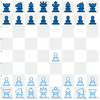Just what it says on the tin. It’s a great compliment to the recommended speaker list I published.
Dispatches From The Internets
50 Female Tech Influencers You Need To Follow on Twitter
Analytics confirm the need for adaptive web design

I cite this post a ton in my talks and workshops (and in the forthcoming second edition of Adaptive Web Design), but I realized I had not explicitly linked it up here.
This post is a look at browser stats for an industry/research site over a size year period of 6 years. Jason’s findings are astonishing, making this post a must-read for coming to terms with the need for designing with progressive enhancement in mind.
The changing form of the web browser

This is an interesting thought piece from Peter Gasston, examining where browsers are heading and what their role in the future of delivering content and interaction will be.
Supercharging JavaScript performance with asm.js

I’m intrigued by the power of asm.js, but have not found a use for it…yet. I hope to resolve that in the future.
Regardless, it’s in Microsoft Edge now, so that’s pretty badass.
Opt Out From Online Behavioral Advertising By Participating Companies
Did you know you can opt out of behavior-tracking advertising cookies? Neither did I.
Why Computer Programmers Should Stop Calling Themselves Engineers

I have been grappling with a lot of the concerns this fantastic article raises. In particular, this bit resonated with me:
Would-be “engineers” are encouraged to think of every project as a potential business ready to scale and sell, rather than as a process of long-term training in disciplines where concerns for social welfare become paramount. Engineering has always been a well-paid profession, but computing is turning it into a type of speculative finance rather than a calling.
It’s a generalization, but it’s also a trend I’ve been seeing. I’m also on the fence regarding licensure and continuing education credits. I think they could do a lot to improve the state of the Web without destroying the wonderful DIY nature of its accessibility.
Less content marketing, more quality content

I’ll just let Gerry say it:
If there has been a constant in my 20+ years of consulting with websites it is that most websites produce far too much low quality ego content. This is true for both commercial, government and non-profit websites.
- Telenor of Norway deleted almost 90% of their pages. Conversions went up by 100%. Support requests went down by 35%
- The Norwegian Cancer Society removed almost 90% of their content and saw extremely positive results.
- The US Department of Health deleted 150,000 of their 200,000 pages. Nobody noticed.
- Columbia University of Chicago deleted 97% of their pages. Student application inquiries went up by 80%
- Liverpool City went from 4,000 pages to 700 on their website. Support requests went down and online reporting went up.
Clear, well-written content is appreciated (and actionable) by your users.
Panels and panel sets

This is an interesting proposal for generic panel and panelset (and paneltitle) elements that would function well for marking up accordion, tabbed, and carousel interfaces.
Future of Web Design & Øredev
Between Future of Web Design in New York City and Øredev in Malmö, Sweden, I was a busy boy last week. I delivered three talks and a workshop in total and am a bit exhausted.
How Our CSS Framework Helps Enforce Accessibility

I love this post so much. The tab example is pretty much identical to the approach I’ve been using for a while now.
By making our selectors tied to proper semantic choices, we limit the likelihood that poor decisions will be made in HTML and covered up by CSS and JavaScript (which also introduce additional dependencies we aren’t guaranteed will make it to our users).
Read it. Ruminate on it. Implement it.